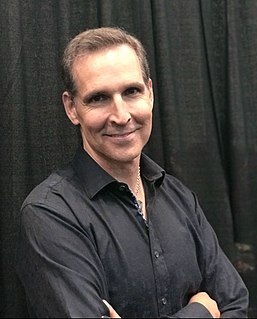A Quote by Neri Oxman
The second-most abundant biopolymer on the planet is called chitin, and some 100 million tons of it are produced every year by organisms such as shrimps, crabs, scorpions, and butterflies. We thought if we could tune its properties, we could generate structures that are multifunctional out of a single part.
Related Quotes
The UN special envoy on food called it a 'crime against humanity' to funnel 100 million tons of grain and corn to ethanol when almost a billion people are starving. So what kind of crime is animal agriculture, which uses 756 million tons of grain and corn per year, much more than enough to adequately feed the 1.4 billion human who are living in dire poverty?
(On the energy radiated by the Sun) It's four hundred million million million million watts. That is a million times the power consumption of the United States every year, radiated in one second, and we worked that out by using some water, a thermometer, a tin, and an umbrella. And that's why I love physics.
Now, we put out a lot of carbon dioxide every year, over 26 billion tons. For each American, it's about 20 tons. For people in poor countries, it's less than one ton. It's an average of about five tons for everyone on the planet. And, somehow, we have to make changes that will bring that down to zero.
If I could get every single cancer genome sequence that has been sequenced; if I could ever put it in one repository, we have the capacity to do a million billion calculations per second. We'll be able to find out more in 10 minutes more than it would take 10 Nobel laureates 10 years to find out about the patterns of cancer and the cures for cancer.
Longing is the fullest sense of desire; it's the most deeply felt kind of desire. I think the most interesting artwork comes out of some sense of longing. It could be called dissatisfaction; it could be called distance. There are many kinds of wanting to get closer to something else, whether that is an idea, a body, a place. Longing is also one of the conditions people approach reading, visual art, or music with - it's to satisfy that sense of longing. It's part of my job, on some level, to grapple with that notion.
For two generations up through the mid-1980s, many thought we were losing the Cold War, even in early 1989, few believed that Poland`s solidarity movement could win, that the Iron Curtain would come down, that the Baltic states could be free, that the second of the 20th century`s great evils, communism, could be vanquished without war, but it happened and the West`s great institutions, NATO and the E.U., grew to embrace 100 million liberated Europeans.
Evolutionary biologists often appeal to parsimony when they seek to explain why organisms "match" with respect to a given trait. For example, why do almost all the organisms that are alive today on our planet use the same genetic code? If they share a common ancestor, the code could have evolved just once and then been inherited from the most recent common ancestor that present organisms share. On the other hand, if organisms in different species share no common ancestors, the code must have evolved repeatedly.
In fact, one of the arguments for searching for intelligent life in space, elsewhere, is that we have no evidence that intelligence has any survival value. The most successful creatures on this planet are the cockroaches. They've been around, what is it, 100 million years or so and I suspect they'll still be there 100 million years in the future. Maybe intelligence is an evolutionary aberration which dooms its possessors in the way armor may have doomed some of the dinosaurs.








































